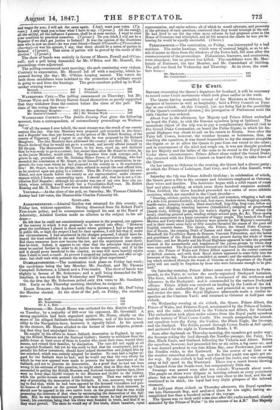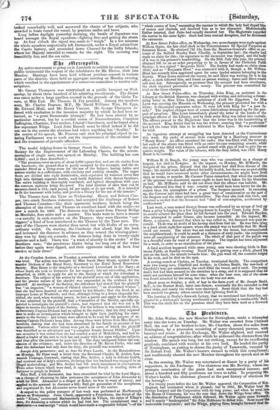Win eourt.
BEFORE recounting the Queen's departure for Scotland, it will be necessary to record some Court movements which took place earlier in the week.
The Queen having assembled several of her Ministers at Osborne, for purposes of business as well as hospitality, held a Privy Council on Tues- day at one o'clock. At this Council, [an eye being had to the possibility of the Queen's continued absence,] the prorogation of Parliament until the 12th October was ordered.
About four in the afternoon, her Majesty and Prince Albert embarked on board the Fairy, to visit the Russian squadron lying at Spithead. The immediate object of the trip was to pay a complimentary farewell visit to the Grand Duke Constantine, on board the Pallas frigate, in which his Im- perial Highness was about to sail on his return to Russia. Soon after the Fairy left Cowes, however, the weather became so boisterous, that, on reaching the squadron, it was found impossible to lay the steamer alongside the frigate so as to allow the Queen to pass from one vessel to the other; and in consequence of the wind and rough sea, it was not thought prudent for her Majesty and the ladies of the suite to be rowed in the Royal barge. Under these circumstances, Prince Albert alone visited the Grand Duke; who returned with the Prince Consort on board the Fairy, to take leave of the Queen.
On her return to Osborne in the evening, the Queen had a dinner-party ; at which the Prince of Leiningen, Earl Grey, and Lord John Russell, were guests.
Saturday the 7th was Prince Alfred's birthday; in celebration of which, the Queen gave a fete to the servants and labourers employed at Osborne, their wives and families. The festivities began with a solid repast of roast beef and plum pudding, at which some three hundred retainers assisted. Thus fortified, the three hundred proceeded to a series of more athletic exercises, which are recorded in the Court circular— "Dancing, cricket, quoits, trap-bat and ball, and rounders, whipping a ball out of a hole (six persons hooded), foot-ball, foot-races, donkey-races, hopping-match, hurdle-races, jumping in sacks, blind-man's-buff, leap-frog, long-rope, follow my leader, and skipping, wheeling barrows (blindfolded), snapping at gingerbread (hands tied), bobbing for apples (in water), dipping for a piece of money (in meal), climbing greased poles, winding strings around pegs, &c. &c. These sports afforded amusement to a large concourse of happy people. The bands of the Royal Marines and Forty-third Light Infantry were present by her Majesty's command' and to their music some forty or fifty couples threaded the mazes of the good old English country-dance. The Queen, the Prince, the Grand Duke Constan- tine of Russia, the reigning Duke of Nassau and their respective suites, Count Mensdorffi his Excellency Baron de Brunow, Viscount Palmerston, and the ladies and gentlemen of the Royal Household, were present during the whole of these festivities; and her Majesty and his Royal Highness appeared to take the greatest interest in the amusements and happiness of the joyous groups by whom the7 were surrounded. The Royal children formed not the least interesting part of this scene: the Prince of Wales and Prince Alfred appeared in the correct costume of British seamen, and with their Royal sisters appeared to enter fully into the humours of the day. The whole concluded at sunset; and the enthusiastic cheer- ing which reechoed through the woods of Osborne on the departure of the Royal party will not easily be forgotten by those who were fortunate enough to be pre- sent"
On Saturday morning, Prince Albert came over from Osborne to Ports- mouth, in the Fairy, to review the newly-organized Dockyard battalion. The force, which numbers 2,200 men, is composed of the workmen and labourers in the Dockyard; and is commanded by the various Dockyard officers. Prince Albert was received on landing by the Lords of the Ad miralty and the authorities of the port; and proceeded at once to inspect and review the men. His Royal Highness afterwards made a similar in- spection at the Clarence Yard; and returned to Osborne at half-past one o'clock.
On Wednesday evening at six o'clock, the Queen, Prince Albert, the Prince of Wales, and Princess Royal, accompanied by the Prince of Leinin- gen, and the suite, embarked in the Victoria and Albert, for Scotland. The embarkation took place under salutes from the Royal yacht squadron and the battery of West Cowes Castle. The vessels composing the attend- ant squadron were the Fairy, the Undine, the Black Eagle the Scourge, and the Garland. The flotilla passed through Cowes Road; at full speed; and anchored for the night in Yarmouth Roads, L W.
Soon after daybreak on Thursday morning, the squadron got under way; the Scourge taking the lead through the Needles passage; the Fairy, Un- dine, Black Eagle, and Garland, following the Victoria and Albert. Before the squadron, however, had proceeded five or six miles, a fog came on; and it was deemed prudent to run into Allan:: Bay, near Freshwater, just under the Needles rocks, to the Eastward. In the course of an hour or so the weather somewhat cleared up, and the Royal yacht was again got un- der way. By nine o'clock it had well cleared the rocks, and was steaming away at full speed to the Westward. There was a smart breeze blowing up Channel from the South-west, but comparatively little sea.
Swanage was passed soon after ten o'clock; Weymouth about noon. The people on shore were diligent in hoisting colours at every prominent place; but as the squadron did not keep very close to the land, and the air continued to be thick, the loyal had very slight glimpses of the beloved steamers.
At half-past three o'clock on Thursday afternoon, the Royal squadron ran into Dartmouth Bay, and anclorad there for the night; having ac- complished less than a hundred miles of the voyage. The Queen was on deck until some time after the yacht anchored, closely attended by the Prince of Wales "in the costume of an A.B." Her Majesty
tooled remarkably well, and answered the cheers of her subjects, who crowded in boats round the vessel, by gracious smiles and bows.
Long before daylight yesterday morning, the bustle of departure was heard amongst the Royal squadron—lighting fires and getting the steam up. At four o'clock the signal was made to ” weigh." In a few minutes the whole squadron majestically left Dartmouth, under a Royal salute from the Castle battery, and proceeded down Channel for the Scilly Islands; where her Majesty intended to remain for the night. The morning was beautifully fine, and the sea calm.



























 Previous page
Previous page